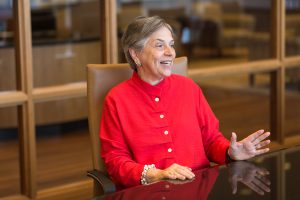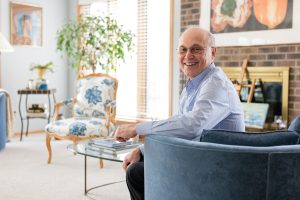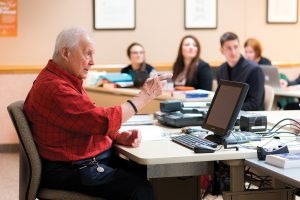Eileen Roberts: Staying connected to former students after return to private practice
Students were Eileen Roberts’ favorite thing about her 24 years at William Mitchell, and she’s found multiple ways in her current job to stay connected with them.
She works with some former students at Dorsey & Whitney LLP, where she is Of Counsel, and she often meets one or two former students per week for lunch or coffee in downtown Minneapolis. She’s in a monthly book club with several former students, and she regularly fields questions about real estate law from those she’s taught.
In fact, it was a chance meeting with a former student in the skyway in Minneapolis in the spring of 2013 that led to her job with Dorsey, where she works part time doing a range of real estate matters.
 “Students bring such energy to the classroom. My favorite students were the inquisitive ones. They constantly challenged me to think about real estate law differently, to dig more deeply into legal history and analysis, and to come up with better and better ways to explain both basic and complex legal principles. I had practiced real estate and land use law for nine years before I started teaching, and I’d been a law clerk for two years before that, so I felt that I had a good working knowledge of real estate and land use law. Thanks to my students, though, my knowledge and understanding of real estate law deepened during my time at Mitchell because I had to explain not only how but why real estate law works as it does.”
“Students bring such energy to the classroom. My favorite students were the inquisitive ones. They constantly challenged me to think about real estate law differently, to dig more deeply into legal history and analysis, and to come up with better and better ways to explain both basic and complex legal principles. I had practiced real estate and land use law for nine years before I started teaching, and I’d been a law clerk for two years before that, so I felt that I had a good working knowledge of real estate and land use law. Thanks to my students, though, my knowledge and understanding of real estate law deepened during my time at Mitchell because I had to explain not only how but why real estate law works as it does.”
At Dorsey, Roberts works with clients and also does lots of CLEs and other presentations. She serves as a mentor to new Dorsey associates and also participates in Dorsey’s pro bono work at the Brian Coyle Legal Clinic in Minneapolis, advising recent immigrants on legal issues. Roberts helped establish the Center for Law and Business at William Mitchell, and she has served on the center’s advisory board.
Roberts graduated from Mitchell in 1980. Her husband, Chuck Hoyum, was a year behind her, though the two didn’t meet until decades later. Married in 2005, they live in Edina and love staying in touch with friends and taking their rescue dogs, Sophie and Roxey, for walks around the Minneapolis lakes. They also travel as often as they can, including recent trips to Charleston, S.C., and Cancun, Mexico. When they’re home, Roberts enjoys gardening, reading, and cooking.
She encourages former students who want to stay in touch to email her at Dorsey. “I love working at Dorsey. It’s a wonderful job. I lucked out.”
Peter Thompson: Balancing volunteering, professional activities, and grandkids
Twenty five years ago, Peter Thompson’s wife, Vicki, helped start a homeless ministry at Wayzata Community Church. Now with time on his hands, he volunteers to run it. “It’s come full circle,” he says.
Thompson taught for four years at William Mitchell College of Law before moving in 1977 to Hamline University School of Law, where he spent nearly 40 years teaching and serving a stint as acting dean. He retired in 2015 and has found a balance of volunteering, continued professional work, and family.
He organizes his large congregation’s involvement in Families Moving Forward, a consortium of congregations that hosts a rotating nightly shelter. He recruits 80 volunteers to cover four weeks, lines up food, and, when needed, sleeps on a couch at church.
“I’ve met some really good parents and some terrific kids,” says Thompson. “Almost all the parents have jobs, but they just don’t pay enough. Then they get caught in some temporary issue and all of a sudden they’re out of a place to live.”
In the professional realm, Thompson takes arbitration cases, usually two or three a month. He became an arbitrator while he taught trial skills as a “way to keep in touch” with how lawyers present cases. “I love good lawyers and I like to see a good argument.”
He resolves automobile insurance claims through the American Arbitration Association’s no-fault arbitration program and recently took training to chair the Financial Industry Regulatory Authority’s three-arbitrator panels to settle securities disputes between stockbrokers and investors, including claims from people who lost money during the recession.
Though he’s no longer in the classroom, Thompson’s scholarship continues to inform the field. He is updating the three-volume “Mediation: Law, Policy and Practice” with other faculty, including Mitchell Hamline Professor James Coben, former director of the Dispute Resolution Institute. He writes annual supplements to “Evidence” in the Minnesota Practice Series, drawing on expertise built over years of teaching evidence and serving as reporter of the Minnesota Supreme Court committee that drafted the Minnesota Rules of Evidence.
Thompson and his wife celebrated his 70th birthday in November on Captiva Island off Fort Myers, Fla., with his three children, their spouses, and nine grandchildren. Back in Minnesota, they stay on top of a complicated schedule of grandkid activities and pitch in with driving.
“I’ve seen a lot of hockey, a lot of soccer, and some dancing and swimming,” said Thompson. On those rare days he doesn’t see them, he can still stay in touch. He just learned how to FaceTime his 13-year-old granddaughter.
Bobbi McAdoo: Helping son, while still staying engaged in dispute resolution
Bobbi McAdoo is glad she retired before her autistic son graduated from college. Over the last two years, she has taken on what she describes as an almost full-time job helping him line up housing, Medicaid waivers, disability income, and part-time work as an AmeriCorps public school reading tutor.
“A lot of my energy has been spent trying to figure out what his life is really going to look like,” she says. “My husband and I tag team all that there is to do for him.”
 McAdoo joined the faculty at Hamline University School of Law in 1984. She founded the respected Dispute Resolution Institute and spent a career teaching and evaluating mediation and other court-connected alternative dispute resolution choices. It was a field she embraced after working as an attorney for Dorsey & Whitney, where she saw firsthand the failure of litigation to solve many disagreements.
McAdoo joined the faculty at Hamline University School of Law in 1984. She founded the respected Dispute Resolution Institute and spent a career teaching and evaluating mediation and other court-connected alternative dispute resolution choices. It was a field she embraced after working as an attorney for Dorsey & Whitney, where she saw firsthand the failure of litigation to solve many disagreements.
Since retiring in 2014, she has served on a steering committee helping DRI and current director Sharon Press step into a new public engagement role. An initial grant-funded project involved facilitating conversations with stakeholders around St. Paul Public Schools’ search for a new superintendent. McAdoo is working on the evaluation of that effort.
“We have a world out there in conflict,” says McAdoo. “And these conflicts are not going to be solved with new laws. We need to find ways for people to talk together, really feel their perspective has been heard, and then work together for real-life solutions.”
McAdoo also serves on an American Bar Association ADR Section committee reviewing empirical research that has been done on mediation to find evidence for recommended “best practices” for mediators.
As her son becomes more stable, McAdoo hopes to use her expertise to advocate for others with disabilities. For now, she serves on the board of Hampshire Country School in New Hampshire, a boarding school for boys on the autism spectrum that she credits with turning around her son’s education after he floundered at five schools in Minnesota.
In part because of her son’s needs, and to stay close to her grown daughter and son-in-law, McAdoo and her husband will stay in Minnesota. They have just downsized from Arden Hills to a historic condo on Ramsey Hill in St. Paul. They have renovated it, and McAdoo is excited to work in the southwest sunroom.
“My desk is in that sunroom, along with two chairs where my husband and I will have our morning coffee,” she says. “I call it my Florida room because it’s painted this lovely pale blue green gray.” It will be a space to inspire the next chapter of her life.
Doug Heidenreich: Still enjoying the classroom after more than half a century
Doug Heidenreich still finds joy in teaching, something he’s been doing since 1963, when he was hired as assistant dean and professor at William Mitchell College of Law.
“I very much enjoy being in the classroom with students,” says Heidenreich, who graduated from Mitchell in 1961 and served as dean from 1964-1975. “I may have discussed the same case 10 or even 20 times, but no matter how many times I’ve gone over something, the student is looking at it for the very first time,  and they’ll sometimes come up with an idea that I haven’t thought of.”
and they’ll sometimes come up with an idea that I haven’t thought of.”
As Mitchell Hamline’s longest serving faculty member, Heidenreich teaches contracts and professional responsibility, which he says can be boiled down to the title of Spike Lee’s movie “Do the Right Thing,” printed at the top of his syllabus.
“It’s easy to say ‘always do the right thing,”’ Heidenreich says. “But figuring out what the right thing is isn’t easy. The important thing is to think about what will be your guiding principles. What will help you decide ‘I will do something in this way’ or ‘I will refuse to do that?’”
Heidenreich’s limited responsibilities as an emeritus professor now leave him more time for long lunches with friends and other pursuits. He took annual trips to Paris until walking became difficult. His last trip was five years ago for his 80th birthday. Now he explores close to home. On most Saturdays, he and professor Colette Routel, co-director of the Indian Law Program, meet for breakfast and drive through Fort Snelling State Park to look at deer.
A lover of history, Heidenreich was tapped to write William Mitchell’s history for its 100th anniversary in 2000. He also explores Plantagenet and Tudor history from an armchair in his condo near the University Club in St. Paul. It’s a period he has returned to over a lifetime in part because “English history is the history of the development of our law.”
And recently, he spent some time on the wrong side of the law. For the last dozen years, Heidenreich has been involved in annual re-enactments of famous gangster trials, performed in the historic courtrooms of St. Paul’s Landmark Center. Last September, he acted the part of Clayton May, a Minneapolis doctor who was convicted of harboring a federal fugitive after he patched up injured gangster John Dillinger following a shootout in St. Paul.
“It’s fun to play the bad guy,” he says.
